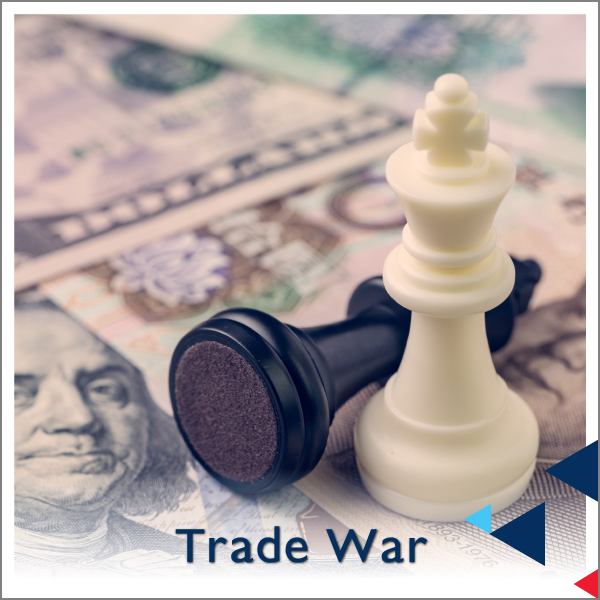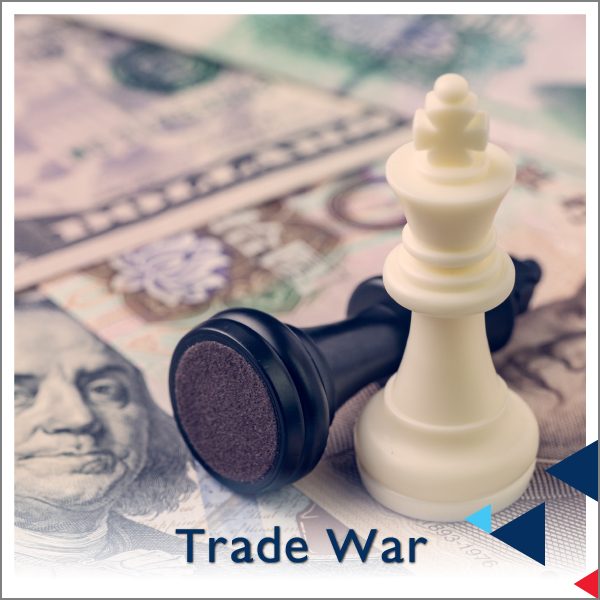
คำสงครามการค้า ดูจะได้พบเห็นกันบ่อยตามสื่อในช่วงนี้ เป็นผลจากที่สองประเทศมหาอำนาจทำการสู้รบกันด้วยมาตรการทางการค้า(trade measure)ต่างๆ กันอยู่ ลองดูความหมายพื้นฐานไปพร้อมกับเทียบศัพท์ต่างๆที่เกี่ยวข้องในภาษาอังกฤษกันค่ะ
อาวุธที่ต่อสู้ใช้มีตั้งแต่เพิ่มพิกัดอัตราภาษีศุลกากร (tariff) ลดจำนวนโควต้านำเข้า(import quota) มาตรการสร้างอุปสรรคทางการค้าที่ไม่ใช่ภาษี (non-tariff barrier) จนถึงขั้นที่ร้ายแรงที่สุดคือห้ามการนำเข้าสินค้า/วัตถุดิบ (banning trade) จากอีกฝ่ายไปเลย โดยมักอ้างว่าไม่ได้รับความเป็นธรรมในการทำธุรกิจ โดยเฉพาะมีสินค้าที่มีราคาถูกกว่าจากประเทศคู่กรณีมาทุ่มตลาด(dumping) ทำให้เกิดการขาดดุลการค้า(trade deficit)เป็นอย่างมาก จนส่งผลเสียหายต่อความประเทศได้
เนื่องจากรูปแบบการค้าของโลกในปัจจุบันที่พยายามให้อิงหลักการค้าเสรี(free trade) เพื่อประโยชน์ต่อผู้ทำธุรกิจและผู้บริโภคโดยรวม โดยอยู่บนฐานของระบบตลาดเดียวกันทั้งโลก (global single market) และเลี่ยงไม่ให้เกิดลัทธิคุ้มครองการค้า/มาตรการกีดกันทางการค้า (Trade Protectionism) การทำสงครามการค้าเช่นนี้อาจมีประโยชน์ในระยะสั้น แต่หากมาตรการเช่นนี้ยังดำเนินต่อไปหรือเพิ่มปริมาณมากขึ้นเรื่อยๆ จะทำให้ภาวะการค้าระหว่างประเทศ(international trade)ซบเซา นักเศรษฐศาสตร์สายหนึ่งเชื่อว่าท้ายสุดจะนำมาซึ่งความเสียหายต่อประเทศคู่กรณี และผู้ที่ได้รับผลกระทบมากที่สุดก็คือผู้ที่ทำธุรกิจและผู้บริโภค
Trade War ไม่ใช่สิ่งใหม่ อย่างน้อยก็เคยเกิดมาตั้งแต่เป็นยุคอาณานิคมในคริสต์ศตวรรษที่17 ที่ประเทศเจ้าอาณานิคมต่างกีดกันไม่ให้อีกฝ่ายเข้าไปทำการค้าขายในประเทศใต้อาณัติของตนเอง และเป็นที่เชื่อกันว่านโยการการกีดกันทางการค้าในช่วงทศวรรษ 1930 เป็นชนวนหนึ่งของสงครามโลกครั้งที่สองด้วย
‘Trade war’ has become a term used frequently in the media. A ‘trade war’ results from an economic struggle between two super-power nations. Several trade measures can be employed during a trade war. Let’s explore more about this term, as well as others.
The ‘weapons’ used doing a trade war can include tariff increases, limits on import quotas, and non-tariff barriers. One of the most severe acts that can be employed during a trade war is the banning of all trade. These tactics are executed with the justification that another country is trading unfairly, which causes consequences for trade deficits, and eventually national security.
As today’s global trade market is based on ‘free-trade’ and ‘global single market’ policies, for the benefit of business people and consumers, any measures relating to trade protectionism should be avoided. Trade wars may bring benefits in the short term, but can bring about damages for all sides in the long run, especially for individuals, many economists believe.
Trade wars are not a new thing. They happened as far back as the 17th century during the period of Colonialism. The practice of trade wars in the West in the 1930s is assumed to be one of the factors leading to World War II.




